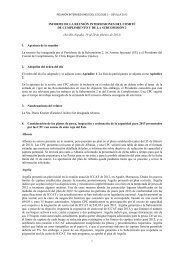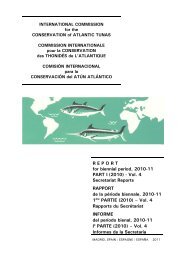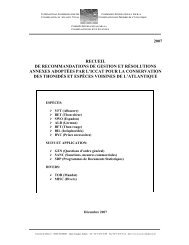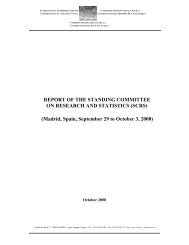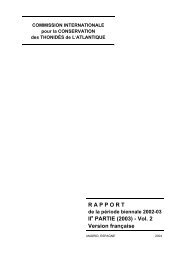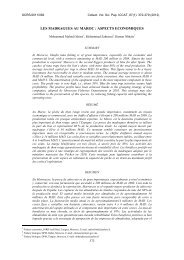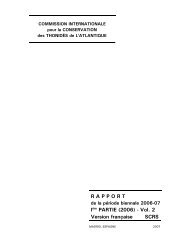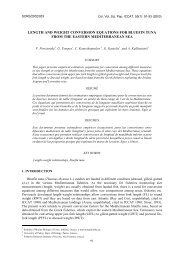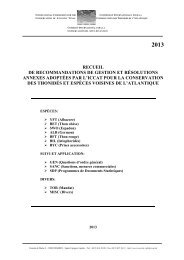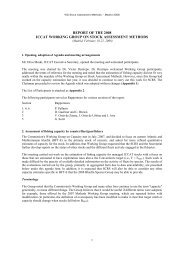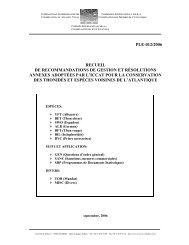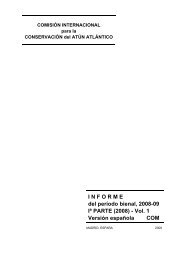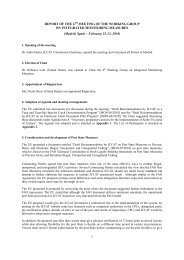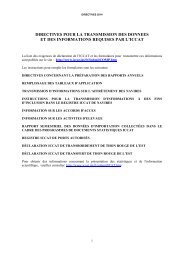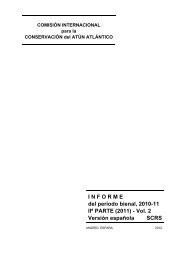E - Iccat
E - Iccat
E - Iccat
You also want an ePaper? Increase the reach of your titles
YUMPU automatically turns print PDFs into web optimized ePapers that Google loves.
ICCAT REPORT 2012-2013 (I)<br />
Sharks<br />
IGFA recommends that ICCAT adopt measures to require that all sharks be landed with fins naturally attached.<br />
Such a measure would help further curtail illegal shark finning practices.<br />
Compliance<br />
ICCAT members must take action to strengthen measures to help reduce or eliminate IUU fishing.<br />
• IGFA urges ICCAT members to fully implement the electronic bluefin catch documentation (eBCD)<br />
program by the start of the 2013 Mediterranean purse seine fishing season.<br />
• IGFA urges ICCAT to take all necessary steps to end illegal driftnet fishing for bluefin tuna and<br />
swordfish and to take action against all vessels that have been identified as engaging in IUU fishing.<br />
• IGFA recommends better identification of fishing vessels, particularly those fishing for bluefin tuna.<br />
General<br />
Recreational angling is a growing and economically vibrant entity in many countries and we wish that ICCAT<br />
recognize both its relevance and that it may necessitate alternate management objectives than those used in<br />
commercial fisheries. IGFA kindly offers its consultation to ICCAT on recreational fisheries issues.<br />
58<br />
• Current ICCAT quota allocation and reallocation policies do not take into consideration the economic<br />
value of catch and release recreational fisheries. ICCAT Contracting parties should be free to utilize quota<br />
as they desire, even if it is not fully harvested without penalty of quota redistribution.<br />
• Managing fisheries on the basis of MSY is an excessively risk-prone approach. As such, we suggest that<br />
ICCAT adopt a target objective below MSY to compensate for biological, environmental and data<br />
uncertainties.<br />
International Seafood Sustainability Foundation (ISSF)<br />
The International Seafood Sustainability Foundation (ISSF) is a global partnership among the tuna industry,<br />
science and WWF, the global conservation organization. Our mission is to work toward the science-based<br />
conservation and management of tuna stocks and the protection of ocean health by supporting regional fisheries<br />
management organizations and advocating for the recommendations of each organization’s scientific advisory<br />
body.<br />
The first part of our statement addresses three of the most important issues facing global tuna sustainability:<br />
reference points and harvest control rules, fleet capacity and the management of FADs. The second part<br />
addresses challenges specific to ICCAT.<br />
Global issues<br />
Harvest Control Rules (HCRs) and Reference Points. HCRs are a set of well-defined management actions to be<br />
taken in response to changes in stock status with respect to target and limit reference points. Unless there is a<br />
pre-agreed upon action plan for avoiding overfishing or for rebuilding an overfished stock, long negotiations<br />
lead to delayed action or inaction. This delay can lead to further damage to the stock, requiring even more<br />
aggressive curtailing of fishing. The adoption of HCRs is a key aspect of modern fisheries management, and is<br />
also a requirement of several eco-label certification programs.<br />
ISSF endorses the application of the Precautionary Approach using clear target and limit reference points and<br />
HCRs, as called for by the UN Fish Stocks Agreement and by some RFMO Conventions. While most tuna<br />
RFMOs have at least begun consideration of limit reference points through their science committees, none have<br />
fully implemented these measures. ISSF urges all tuna RFMOs to adopt stock-specific limit and target reference<br />
points and HCRs. This is one of the most important actions that RFMO members can take to ensure the<br />
long-term sustainability of tuna stocks.<br />
ISSF applauds ICCAT’s progress in 2011 setting forth a general framework for harvest control rules tied to Kobe<br />
plots in Recommendation 11-13. ISSF now urges the Commission to establish stock-specific target and limit<br />
reference points and to specify the probability levels to be associated with Recommendation 11-13.<br />
Closed Vessel Registries and Management of Fleet Capacity. Experts agree that there is overcapacity in the<br />
global tuna fleets. Fishing fleet overcapacity increases pressure to weaken management measures and eventually<br />
leads to stock overexploitation. The first step towards managing capacity is to establish limited entry via a



